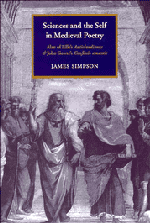 Sciences and the Self in Medieval Poetry
Sciences and the Self in Medieval Poetry Book contents
- Frontmatter
- Contents
- Acknowledgements
- List of abbreviations
- 1 Introduction
- 2 The outer form of the Anticlaudianus
- 3 A preposterous interpretation of the Anticlaudianus
- 4 Alan's philosopher–king
- 5 Ovidian disunity in Gower's Confessio amantis
- 6 Genius's psychological information in Book III
- 7 The primacy of politics in the Confessio amantis
- 8 Poetics
- 9 Conclusion: varieties of humanist politics
- Works cited
- Index
- CAMBRIDGE STUDIES IN MEDIEVAL LITERATURE
6 - Genius's psychological information in Book III
Published online by Cambridge University Press: 15 December 2009
- Frontmatter
- Contents
- Acknowledgements
- List of abbreviations
- 1 Introduction
- 2 The outer form of the Anticlaudianus
- 3 A preposterous interpretation of the Anticlaudianus
- 4 Alan's philosopher–king
- 5 Ovidian disunity in Gower's Confessio amantis
- 6 Genius's psychological information in Book III
- 7 The primacy of politics in the Confessio amantis
- 8 Poetics
- 9 Conclusion: varieties of humanist politics
- Works cited
- Index
- CAMBRIDGE STUDIES IN MEDIEVAL LITERATURE
Summary
INTRODUCTION
I began discussion of the Confessio amantis in the last chapter by considering its outer form. As with Alan's poem, so too with Gower's: both present themselves as coherent formal structures which, on closer inspection, are in fact radically incoherent. In this chapter I would like to draw on one of the interpretative solutions which saved the Anticlaudianus from this radical incoherence. In discussion of Alan's poem, I reached a point (in chapter 3) where it was argued that the poem as a whole represents a psychological unity: Fronesis is the intelligence of the New Man, whose ethical perfection in Books VII–IX provokes, and is presupposed by, the effort of speculative perfection in Books I–VI. The inner form of the poem, I argued, is correlative with the form of the soul: the poem's own narrative trajectory is determined by the soul's fulfilment. As the soul reaches its perfection, so too does the poem come to an end. The form of the poem, that is, is a function of the form of the soul. And once the psychological unity of the poem becomes manifest, so too does the poem's deeper form emerge.
But for that solution to work, it was necessary to understand how the different participants of the Anticlaudianus can in fact be understood as faculties of the single human soul. Can the same be done for the Confessio? I think it can, and I should like in this chapter to show how Genius's ‘information’ is best understood psychologically: Genius represents the imagination, and Amans represents the will of the same soul.
- Type
- Chapter
- Information
- Sciences and the Self in Medieval PoetryAlan of Lille's Anticlaudianus and John Gower's Confessio Amantis, pp. 167 - 197Publisher: Cambridge University PressPrint publication year: 1995
